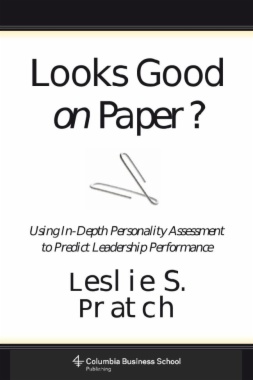Leslie S. Pratch is a practicing psychologist who focuses on assessing and coaching executives who occupy or are candidates for top positions in business organizations. In this book, she shares insights from more than twenty years of executive evaluations and offers an empirical method of identifying executives who will be effective within organizations—and to flag those who will ultimately fail—by evaluating hidden aspects of personality and character.
Pratch compares candidates with impressive careers and tries to determine which are likely to act with consistently high integrity and exhibit sound, timely judgment when faced with unanticipated business problems. Central to effective leadership is a psychological quality called "active coping," which Pratch defines and explores by referencing case studies, historical figures, and her own scholarly work. This book speaks not only to those in hiring positions and their advisors but also more widely to leaders and anyone who wishes to learn more about their own character and the abilities of those around them. Pratch offers knowledge, asks questions, and challenges common perceptions, providing a practical tool for those in business and for the general reader.
- Table of Contents
- Introduction
- Part I: The Theory and Practice of Active Coping
- 1. The Power of Active Coping
- 2. Predicting Performance
- 3. Coping Styles and Coping Holes
- 4. What Lies Beneath?
- 5. Integrity
- 6. Psychological Autonomy: Lemmings Need Not Apply
- 7. Integrative Capacity: Seeing Reality with Both Eyes Open
- 8. Catalytic Coping
- 9. Implications for Female Leaders
- Part II: Enhancing Your Active Coping
- 10. Past Is Not Necessarily Prologue: Improving Your Active Coping
- 11. Self-Assessment for Strengthening Active Coping
- 12. Developing Active Coping: A Success Story
- 13. Conclusion
- Appendix A: Technical Companion to Chapter 3
- Appendix B: Technical Companion to Chapter 4
- Notes
- Bibliography
- Index

